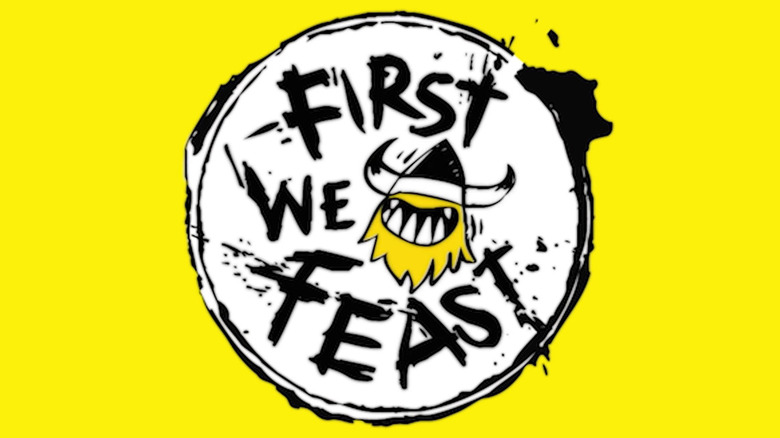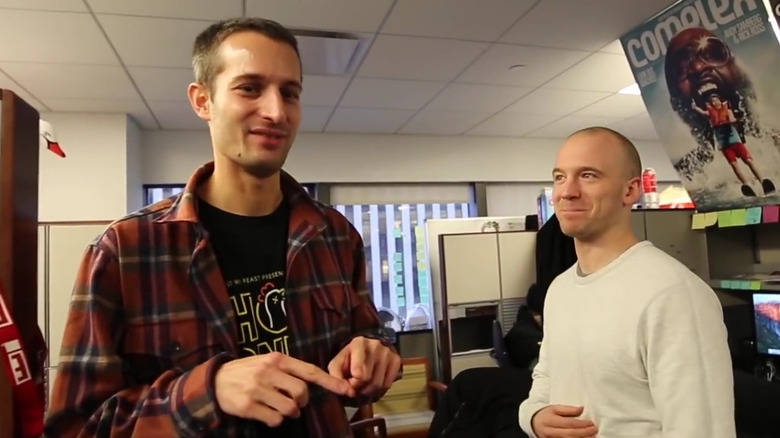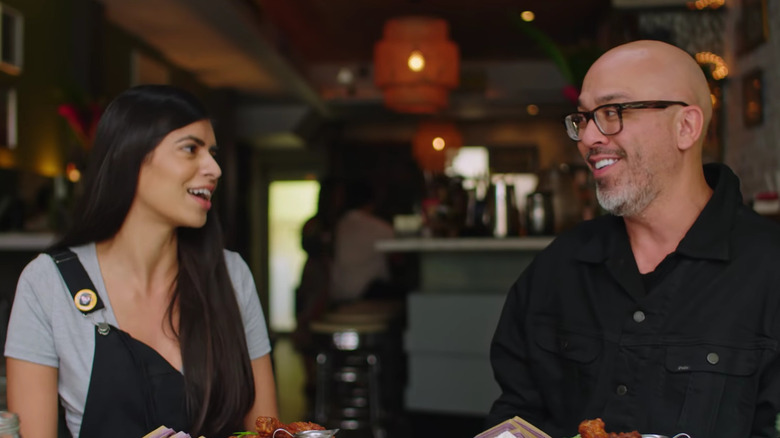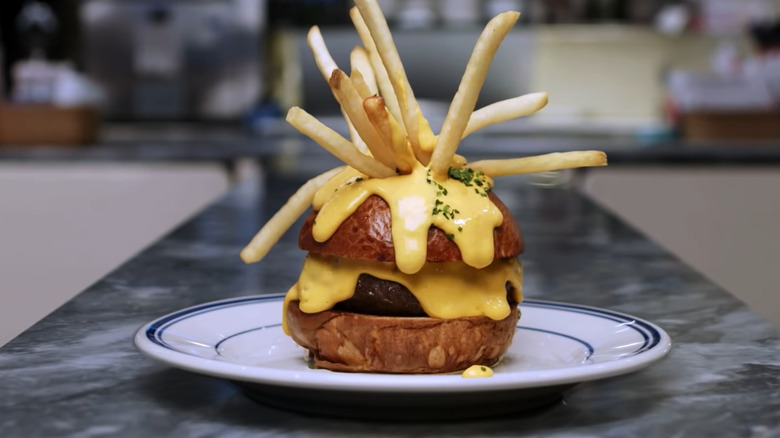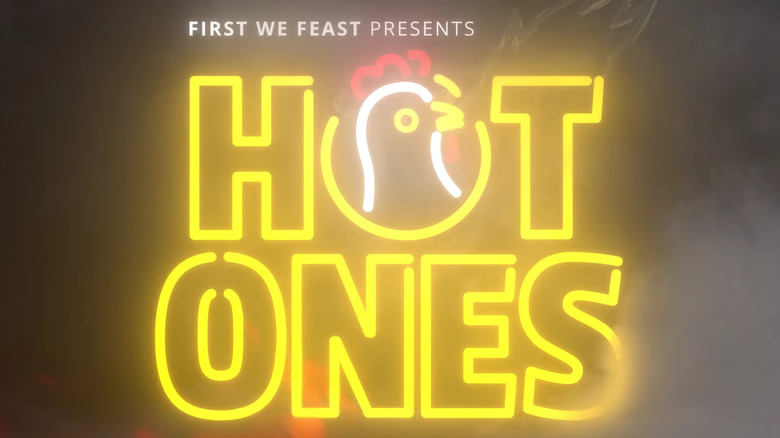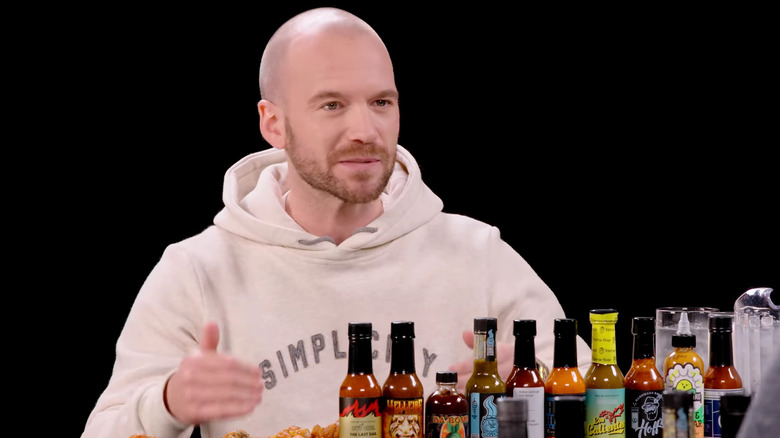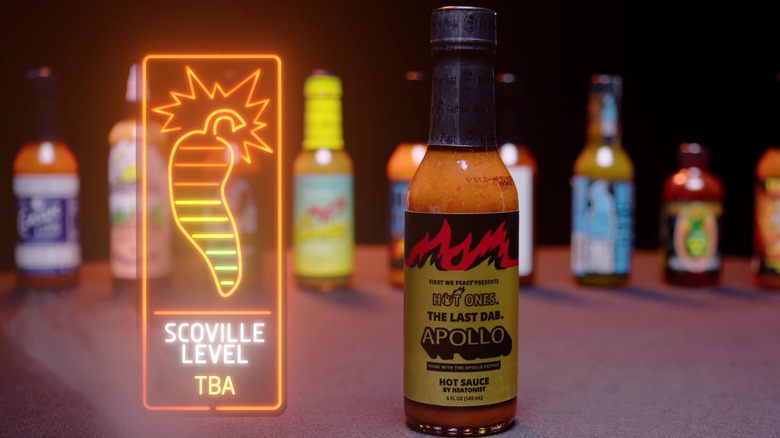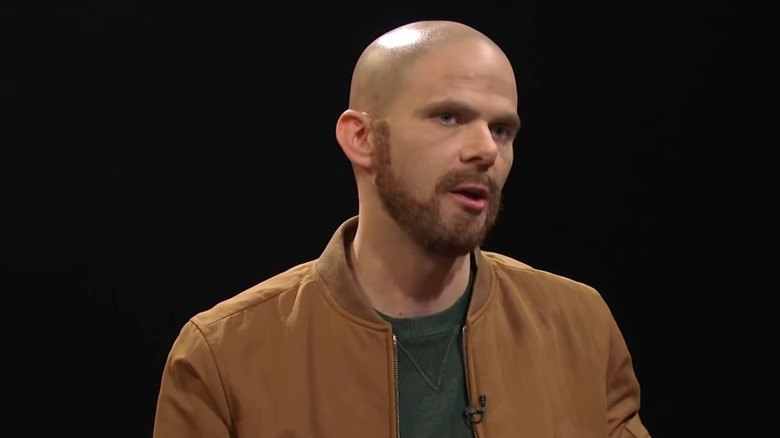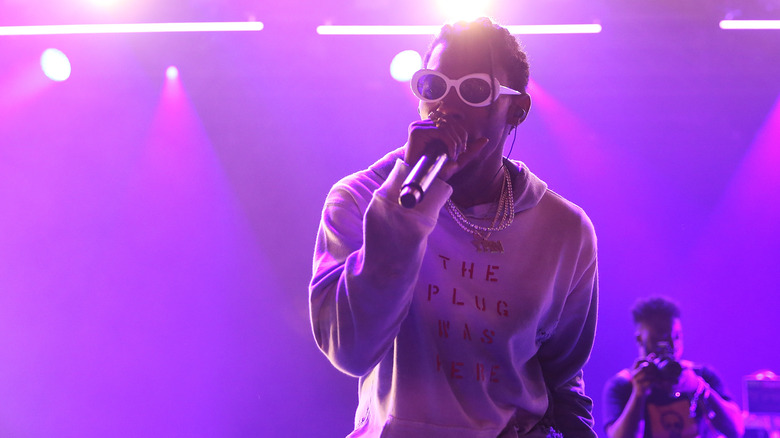The Untold Truth Of First We Feast
You probably know First We Feast from the closing scene of your favorite food-related YouTube shows. You know, the last seconds where other videos from the channel are recommended on a yellow backdrop? With First We Feast's YouTube channel boasting the likes of "Hot Ones," "Pizza Wars," and "The Burger Show," it is safe to say that millions of people have seen this instantly recognizable end scene, and if their views counter are anything to go by, many have clicked the featured videos, too. Producing high quality YouTube content is what First We Feast is known for. Yet a James Beard award for "Group Food Blog" in 2014 (per Eater), indicates that First We Feast's written content is of a similarly impressive standard.
First We Feast was founded in 2012, only two years before being awarded their first James Beard award, and (per Storybench) three before its flagship show "Hot Ones" took the internet by storm. Achieving that level of success in such a short period of time is virtually unheard of. For comparison, it took the eminent online publication Serious Eats twice as long to win the James Beard food blog award (per Eater). So how did First We Feast rise so rapidly in what, at the time, was fast becoming a saturated market? Who is responsible for the wonderful shows that have changed the landscape of digital food media? And why on earth is there a "Hot Ones" hi-top?
First We Feast began as a food blog, run by Chris Schonberger
On paper, Chris Schonberger, the man who would run First We Feast from its inception, strikes you as a conventional Editor-in-Chief. He is a Harvard alumnus, writing extensively for the 149-year-old daily student newspaper, The Harvard Crimson. After college, Schonberger worked his way through the media industry until he arrived at Time Out New York. Here, as associate food and drink editor, Schonberger wrote regularly for Time Out and also had pieces published by Condé Nast Traveler.
Yet, this still doesn't explain how Schonberger came to head a food publication which is celebrated for its ability to dream up new and unique ways of disrupting food media. However, further examination of Schonberger's other works — which include a blog titled "Nacho Hunters" — when combined with comments he made to The Verge begin to reveal the alternative approach which would come to typify First We Feast. Key to this approach is the way food is used to neutralize hierarchical, social, or cultural boundaries. Of course, in First We Feast's most famous show, "Hot Ones," spiced chicken wings are used to break the ice. However, the use of all types of food as an initial entry point into deeper discussions has typified First We Feast as an entity from its early blog posts, and continues to do so as exemplified by its more recent content.
Complex Networks is the parent company of First We Feast
No online publication or content provider could expect the success First We Feast garnered in its initial years. However, First We Feast did have every advantage when it came to their launch, most namely because they were owned, funded, and created by Complex Networks, a media giant which was purchased by Buzzfeed for $300 million (per Hypebeast).
Access to funds which many creators can only ever dream of was only part of the reason why First We Feast became so successful in such a short time frame. With multiple other high-quality brands to their name, Complex Networks knew how to create a new entity that would be hugely successful, even if the topic of food was slightly different from their usual fare of fashion, music, and youth culture. Despite these differences, crossover between the brands is striking. Just like First We Feast, Complex Network's flagship brand Complex features news, articles and, of course, a wildly popular show. "Sneaker Shopping," while appearing far removed from the consumption of spicy chicken wings, bears an uncanny resemblance to First We Feast's premier show, "Hot Ones." Host Joe LaPuma described the show as "a very get-up-and-go type of operation," while the key features of its early iterations was extremely low production costs and a small team (per Glossy) — words almost exactly echoed by "Hot Ones" host Sean Evans when speaking about his show's early days in an interview with The Verge.
First We Feast often uses food as a means of examining culture
First We Feast's popularity is not solely because of the entertainment its videos, articles, and GIFs provide. Rather, as is becoming frequently common in food media, it uses food as a vehicle to examine cultures and processes that shape society, such as immigration. The popularity of such an approach is exemplified by the large-scale success of award-winning podcast The Sporkful, and intersectional newsletters such as Vittles.
First We Feast has used its penchant for producing high-quality videos as a means of entering this sub-culture of food media, while its written work continues to provide the more mainstream fare, such as recipes, associated with traditional food media sites. Perhaps most prominent among these is "The Curry Shop," a show that utilizes the dish as a means of examining questions of identity (per Shorty Awards). Other programs such as "Food Grails" also highlight how food has been used to blend immigrant cultures within American cities (via IMDb).
Yet, First We Feast — as with all Complex Network brands — is predominantly focused on examining pop culture. High-profile celebrities such as musicians and athletes are much more likely to feature in its video franchises than chefs or cooks. That has earned the brand millions of views from the YouTube friendly Gen-Z and millennials, while possibly alienating older generations who are more associated with traditional food media (per Hunter Public Relations).
First We Feast transformed food media video content in the mid 2010s
Digital food media exploded in the early- to mid-2010s, thanks to Buzzfeed-owned brand Tasty. With the use of some clever camera work and editing, Tasty produced their iconic short cooking videos, revolutionizing how food media could be created and consumed (per The New York Times). These sanitized videos rarely if ever featured any form of personality; how could they, when they were predominantly compromised of background music and a pair of hands?
But while Tasty's iconic videos — and the many copies that soon followed — were a fantastic learning tool (and strangely satisfying to watch), they could not really be labeled as entertainment. Attuned to this fact was Chris Schonberger, who came up with the idea for "Hot Ones" as a direct response, per The Verge: "We needed to go way more toward the entertainment side of this and just try something totally new." The approach taken by First We Feast paid dividends, although it took well into the second season for "Hot Ones" — and consequently First We Feast's — video content to really catch on (via The Verge). Ever since the mid 2010s, media brands have been scrambling to replicate First We Feast's entertainment-heavy form of food content, as it continues to soar in popularity (per City University of New York).
First We Feast exploded in popularity thanks to their YouTube content
After knocking the ball out of the proverbial park with "Hot Ones," First We Feast wasted no time in packing their YouTube full of similarly high-quality content. Other online series such as "The Burger Show" were successful from the get-go (per tubefilter) and have contributed to First We Feast's astronomical growth. As of May 2022, First We Feast's YouTube account had over 11.2 million subscribers and more than 2.3 billion total views (via YouTube). These views and subscribers drive masses of traffic to First We Feast's YouTube account every day, while readily available links to their website and various social media accounts ensure that engagement is boosted across platforms.
As for the future, First We Feast shows no sign of slowing down its rapid-fire YouTube release schedule. Shows such as "Pizza Wars" and "Tacos con Todos" continue to offer more food-centric content. This multifaceted approach ensures that a wide range of viewers will find something to enjoy at First We Feast.
Hot Ones is First We Feast's most popular show
The jewel in First We Feast's digital crown is undoubtedly "Hot Ones," a show which involves celebrities being interviewed while eating increasingly spicy chicken wings (per Eater). Although simple in its format, the show remains anything but to both star and host. For the guests, fielding host Sean Evans' trademark in-depth questions can be a difficult task when forcing down chicken bathed in chili sauces that reach an incredible 2 million+ Scoville units (per Sauce Mania). However, the show is no easier for Evans, who not only has to eat the wings alongside the guest, but also perform rigorous research to create the questions.
Fortunately, Evans is joined on this endeavor by First We Feast founder Chris Schonberger. Speaking to Insider, Evans explained the research process: "He'll [Schonberger] send me a big long list of all the podcasts, profiles, and features he's going to listen to and read. I'll usually binge-watch every possible YouTube video — if it's a musician I'll listen to their music, if it's somebody who wrote a book I'll read their book." The thoughtful questions which arise from this process, when delivered with Evans' assuredness, would be a powerful coupling regardless of setting. However, when you add guests who are preoccupied with the burning sensation in their mouth, you get some truly memorable moments, and a number of honest, forthright answers.
Sean Evans has become the unofficial face of First We Feast
The incredible popularity of "Hot Ones" has launched host Sean Evans to fame. As the most recognizable face across First We Feast's platform, Evans has a multitude of roles to play outside of his regular commitments to "Hot Ones." These include featuring in other First We Feast programs, including "Pizza Wars" and "The Burger Show." However, YouTube fame does have its complications, which Evans highlighted when speaking to Esquire: "It's interesting because you become very accessible when you're on YouTube, and so recognizable because it's everywhere ... people really feel connected to you. I think that that's a different thing that happens on YouTube that doesn't happen maybe on TV or in movies — on YouTube people really feel like they discovered you, so they feel like they're a part of it."
The ownership that fans feel over "Hot Ones" and Evans himself can be tiring, especially when there is an equal platform for everyone to express their views. Through experience Evans has learned to not become too bogged down in the criticism aimed at the show or himself. "You do have to find a healthier way to consume that sort of thing ... you don't want to be in that loop where you're reading the good and thinking you're so good and then reading the bad and then thinking you're terrible" (per Esquire).
First We Feast and Heatonist have created a range of hot sauces
While "Hot Ones" and other shows across First We Feast's channel bring in a sizable amount of income via advertising, merchandising can also provide significant revenue streams when executed correctly (via Creator Handbook). The team behind "Hot Ones," deciding to capitalize on this fact, have not only created the standard t-shirts and hoodies associated with every program, but also a range of hot sauces which feature in the show (per Digiday).
Unsurprisingly, the sauces have been a hit with Chris Schonberger, the show's creator, likening the rapid sales of hot sauces to limited edition sneaker drops (via Digiday). The sauces are made with a long-time friend of the show, Heatonist, a hot sauce paradise that sells a range of sauces and offers recipes on how to use them. The sauces Heatonist created for "Hot Ones," such as The Classic, Los Calientes, and numerous variations on the show's hottest sauce, The Last Dab (per Heatonist), are extremely popular, bringing in approximately $7 million in sales annually (via Digiday). As reported by Thrillist, First We Feast and Heatonist are even looking to bring hot sauce mania to a new market: children. A spokesman for "Hot Ones" explained that their new sauce "allows kids to be introduced to the flavorful world of hot sauce, without the leveled up heat that exists in most commercially mild hot sauces on the market."
First We Feast's shows are so popular that they have been both copied and parodied
Impersonation is the highest form of flattery, or so the saying goes. However, "Hot Ones" host Sean Evans doesn't seem to agree with that sentiment. In a tweet Evans called out MTV's show "Wild 'N Out," which features a segment called "Wild Sauce" that has a striking resemblance to Evans' own show (per Dexerto).
Evans did prove much more receptive to a parody performed by Mikey Day and Maya Rudolph on one of TV's most famous programs, "Saturday Night Live" (via Esquire). Having previously stated his love and respect for long-running TV talk shows (via The Hollywood Reporter), it came as little surprise that Evans not only enjoyed the "Saturday Night Live" parody, but also jumped at the opportunity to star in "The Late Show With Stephen Colbert" (per Insider). Evans took to Twitter after the show to express his excitement, stating, "Stephen Colbert eating wings 110x hotter than a jalapeño on The Late Show we really made it."
First We Feast features heavily at the annual ComplexCon
As an organization that aims to epitomize youth, pop culture Complex Networks created ComplexCon as "an unprecedented festival and exhibition conceived to bring together pop culture, art, food, style, sports, music, and more." First launched in 2016, ComplexCon reemerged from the Coronavirus Pandemic in 2021, and is scheduled to run again on November 19-20 of this year (per ComplexCon). Having previously featured musical performances from the likes of ASAP Rocky and numerous highly sought-after sneaker drops (per Digiday), you would be forgiven for assuming there would be little time — or space — for the appreciation of food. Yet, as stated by Complex Networks, the event is "basically our website, magazine, and video operation rolled up into a two-day festival and dropped on the unsuspecting citizens of Long Beach, California." And as one of their leading brands, First We Feast has a definite presence within the fashion-dominant festival.
This is exemplified by last year's ComplexCon, when a curated list of food providers, including Christina Tosi's Milk Bar and a "Hot Ones" pop-up (per First We Feast), formed part of an associated First We Feast food festival (per Digiday). Complex Networks is also launching a virtual version of ComplexCon, called ComplexLand, but it remains to be seen how the network's food brands will fit into this digitized version of the event.
First We Feast has participated in plenty of collabs
A key part of youth culture is the collaboration between big name brands. Think the Louis Vuitton-Nike sneaker release or even the proliferation of album features across hip-hop and other genres. Never one to miss a trick, First We Feast have utilized the collaboration format to further project its brands.
Most famously, "Hot Ones" collaborated with Reebok to produce a range of sneakers (per Reebok). One of these shoes was worn by NBA player Josh Richardson while playing for the Dallas Mavericks (per Esquire). Keen to keep up its relationship with sport, First We Feast also collaborated with NHL team The LA Kings, producing a range of merchandise including a jersey and a special LA Kings-branded version of a hot sauce (via LA Kings). Outside of the sporting world, Youtooz, a designer of collectible soft toys, has created a model of "Hot Ones" host Sean Evans (per Business Wire), while Champion has created a "Hot Ones" hoodie. This diverse offering exemplifies how First We Feast is extending its reach beyond just the gastronomic world and is touching every aspect of youth culture.
First We Feast has helped Complex Networks become the voice of youth culture
Launching a festival with exclusive sneaker drops and performances from the likes of Migos (per Ssense) exemplifies how Complex Networks has become a prominent feature of contemporary youth culture. But how did Complex Networks rise to such a prominent position?
The answer to that question is extremely multifaceted. Yet, the CEO and co-founder of Complex Networks, Rich Antoniello, predominantly puts it down to the business's ability to drive culture, and not just react to it. "I like to say, 'others like to report on the news, we make it.' A lot of our video programming like 'Hot Ones' or 'Sneaker Shopping' or 'Everyday Struggle' — we produce those shows and then all of our 'competitors' then cover our content and iterate off of it" (via Interbrand).
As reported by Mashable, millennials view both eating out and cooking as a means of enjoying different cultures or having an experience, and First We Feast's approach reflects that. Instructional cooking videos are passed over in favor of cultural deep dives, and free-flowing conversations take the place of nutritional information or cooking advice. This emphasis on food as an experience, and one to be shared, at that, marks First We Feast as extremely in tune with the culinary youth culture of today.
